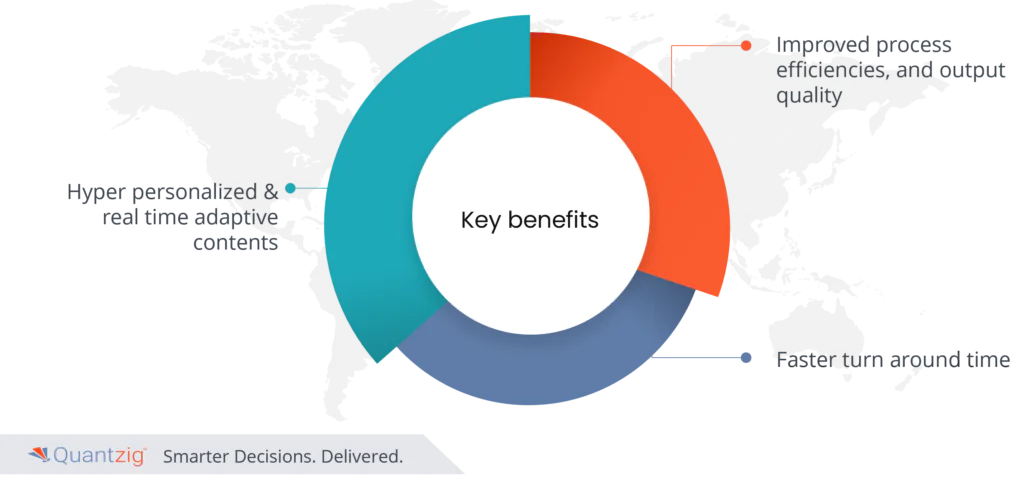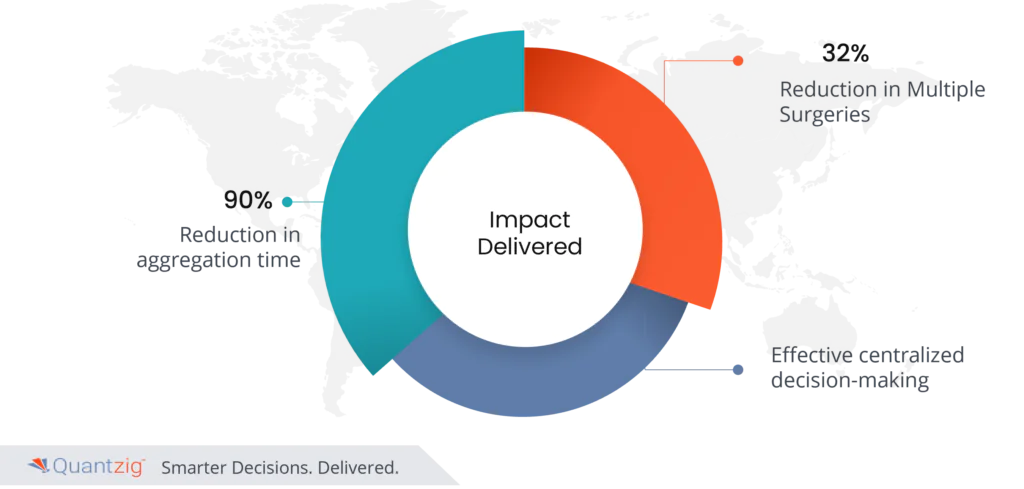Written by: Associate Vice President, Analytics and Data Strategy, Quantzig.
Table of Contents
Introduction to Generative AI in Healthcare
The health care industry is undergoing a transformative shift with the integration of deep-learning algorithms and Artificial Intelligence (AI). These advancements are particularly impactful in managing and interpreting patient healthcare information, especially unstructured data. Gen-AI models and Gen-AI platforms are at the forefront of this change, utilizing an advanced AI tech stack to enhance patient interactions and streamline patient visits. By leveraging Gen-AI chatbots, healthcare providers can efficiently gather and process patient information, providing more personalized care. This Gen-AI opportunity allows for the generation of accurate, data-driven insights and Gen-AI outputs, revolutionizing patient care and making the health care industry more responsive and effective in addressing patient needs.
This article serves as a compelling exploration of how Generative Artificial Intelligence (AI), coupled with advancements in precision medicine and automation, is poised to revolutionize this vital sector.
Book a demo to experience the meaningful insights we derive from data through our analytical tools and platform capabilities. Schedule a demo today!
Request a Free DemoThe Use of Generative AI for Healthcare Companies:

The integration of deep-learning algorithms and Artificial Intelligence (AI) within the health care industry is unlocking unprecedented potential for improving patient outcomes. By efficiently processing unstructured data, these technologies enable the extraction of valuable insights from vast amounts of patient healthcare information. Gen-AI models and Gen-AI platforms enhance the AI tech stack, making it possible to streamline patient interactions and optimize patient visits. The use of Gen-AI chatbots for gathering patient information ensures that healthcare providers have access to comprehensive and accurate data. This Gen-AI opportunity not only improves the quality of care but also generates actionable Gen-AI outputs that support informed decision-making, ultimately transforming the landscape of the health care industry.
As stakeholders and employees navigate the complexities of regulations, guidelines, and ethical considerations, AI-driven solutions offer insights, streamline processes, and facilitate adherence to stringent protocols or targets. The meticulous validation, testing, and planning phases of drug development benefit immensely from AI tools, ensuring that medications meet quality standards, share, efficacy requirements, and patient safety profiles.
In addition, the application of generative AI in advertising, news, customer engagement, customer experience, and consumer interactions enhance awareness, trust, and engagement, forging meaningful connections between healthcare providers, patients, and consumers. As pharma businesses navigate this transformative phase, considerations around data sources, security, personalization, and privacy emerge as paramount concerns. AI platforms prioritize data integrity, security protocols, and compliance frameworks, safeguarding sensitive information and ensuring ethical use across all stages of drug discovery reports.
In the context of personalized medicine, generative AI holds immense potential, tailoring treatment options, and therapies based on individual profiles, genetic factors, and unique characteristics. This personalized approach revolutionizes patient outcomes, enhances quality of life, and fosters a healthcare environment centered on individual needs, preferences, and rights. As AI continues to evolve, healthcare companies, researchers, and stakeholders must remain vigilant, adapting to changes, embracing innovation, and prioritizing ethical considerations in the pursuit of groundbreaking discoveries.
Experience the advantages firsthand by testing a customized complimentary pilot designed to address your specific requirements. Pilot studies are non-committal in nature.
Request a free trial nowExploring Potential Applications of Generative AI in Healthcare
Streamlining Information Gathering
Generative AI stands poised to streamline information collection and reporting within healthcare settings. By engaging patients in understandable language and summarizing data for healthcare providers, it enhances efficiency. For instance, AI can assist in gathering patients’ medical histories by posing questions conversationally and accessing health information exchanges (HIEs) for relevant records. This capability not only aids in assembling comprehensive medical histories but also facilitates better care provision by physicians.
Enhancing Diagnostic Procedures
While AI holds promise in improving diagnostic processes, challenges persist, particularly in diagnosing less common diseases with limited data representation. The scarcity of data hinders AI’s effectiveness, necessitating access to comprehensive datasets. Currently, available generative AI technologies are trained on publicly available data only, underscoring the importance of incorporating extensive medical datasets for accurate diagnostics. Caution should be exercised in deploying generative AI for diagnostics until robust training on medical datasets is achieved.
Navigating Treatment Challenges
The integration of AI into treatment processes presents significant challenges, including accountability, patient trust, and technological limitations. Health care providers bear responsibility for treatments, making the shift of responsibility to AI developers improbable. Moreover, patient trust in AI-managed treatments remains a hurdle. AI’s current technological capabilities do not align with the nuanced tasks performed by physicians in treatment processes. Consequently, widespread integration of AI into medical treatment appears unlikely in the near future.
Optimizing Post-Treatment Monitoring
AI holds promise in post-treatment monitoring and follow-up, leveraging wearable technology and smart devices equipped with sensors. Real-time monitoring and personalized recommendations can enhance patient adherence to post-treatment advice, improving treatment effectiveness. By analyzing extensive patient data, AI enables proactive intervention, alerting providers to potential health deterioration and facilitating timely medical attention.
Advancing Population Health Management
Generative AI, integrated with predictive analytics, offers significant potential in population health management. Leveraging extensive datasets from electronic health records (EHRs) and HIEs, AI identifies at-risk patients who benefit from timely interventions. By assessing patient characteristics, AI predicts outcomes like hospital readmissions, allowing providers to formulate customized care plans. However, the effectiveness of these AI applications relies on access to diverse datasets beyond traditional health records, necessitating integration with data from wearable technologies and smart devices to enhance predictive accuracy and personalized care provision.
Top Benefits of Generative AI Solutions for Enterprises:

- Generative AI presents a transformative potential for the pharmaceutical industry by expediting drug discovery processes through deep learning. It aids in the rapid identification of novel drug candidates, significantly reducing the time and resources required for research and development. This efficiency not only accelerates the availability of new treatments for patients but also lowers development costs, thanks to advancements in precision medicine and virtual screening.
- Furthermore, the versatile application of Generative AI across various functions maximizes the utility of pharma’s drugs. It assists in drug repurposing by identifying alternative therapeutic uses and patterns for existing medications, expanding their market potential. Additionally, Generative AI can predict and optimize drug delivery methods, minimizing risks and enhancing patient safety.
- The benefits of Generative Artificial Intelligence in the pharmaceutical industry extend to cost reduction, faster time-to-market, and improved patient outcomes, driven by innovations in medical imaging and predictive modeling. By streamlining drug discovery, expanding drug applications, and optimizing delivery mechanisms, it revolutionizes the industry’s ability to innovate, adapt, and provide effective solutions to complex medical challenges.
Importance of Generative AI Support for the Pharmaceutical Industry:
Generative AI is a groundbreaking tool in the fast-pace healthcare industry, offering multifaceted benefits.
- Firstly, it enables the creation of new molecules with precise properties, ushering in an era of accelerated drug design, and personalized medicine thanks to advancements in computational biology, biopharma, life sciences, biotech, and virtual screening. Moreover, it facilitates the optimization of drug compounds, leading to enhanced efficacy and reduced side effects, a critical aspect in improving patient outcomes.
- Secondly, through natural language processing, Generative AI plays a pivotal role in drug repurposing, toxicity predictions, and patient stratification, leveraging the power of predictive modeling and bioinformatics. These applications significantly reduce research and development timelines and costs while increasing the chances of successful drug candidates.
In essence, the importance of Generative AI in the pharmaceutical industry cannot be overstated. It accelerates drug discovery, enhances drug optimization, and enables more targeted and effective treatments, ultimately improving patient care in the society, providing accurate information, reducing healthcare costs, and advancing the humans ability to tackle complex medical challenges, diseases, and follow right directions.
Potential Challenges during the Implementation of Generative Artificial Intelligence in the Pharmaceutical Market:
- Implementing Generative AI in the pharmaceutical industry presents both opportunities and challenges, especially in handling some substantial amounts of data for practical training and operation, requiring advanced techniques in data analysis, ChatGPT prompts, and machine learning. Firstly, through natural language processing, Generative AI demands substantial range of relevant data for practical training and operation. The scarcity or inadequacy of high-quality, domain-specific data and emails can hinder the technology’s performance. Accessing, curating, and maintaining such datasets can be resource-intensive and time-consuming.
- Secondly, the complexity of setting up Generative AI for drug discovery is a significant challenge. Developing AI models, integrating them into existing workflows, and ensuring seamless operation across various stages of drug development requires substantial technical expertise and deep learning. This complexity may pose barriers to entry for pharmaceutical companies, especially smaller ones with limited resources.
- Furthermore, regulatory frameworks governing AI’s use in pharmaceutical processes are still evolving, introducing uncertainty and potential delays in adoption. Navigating compliance programs with emerging regulations and ensuring data security and ethical use are critical concerns. This evolving regulatory landscape can slow down adoption among business functions, necessitating a proactive approach to compliance and drug candidates’ risk management.
- Successfully implementing Generative AI in drug discovery demands addressing challenges, including data availability and technical complexity data sets, necessitating expertise in computational biology and bioinformatics.
How Quntzig helped a healthcare company in Transforming Customer Engagement with Generative AI?
A leading retail company based in the United States faced a significant challenge due to their research partnership with over 10 hospitals worldwide. Each hospital maintained distinct parameter tracking systems, leading to a lack of uniformity in data collection and management. This hindered the comparison of research results across the global network. Additionally, the absence of a standardized framework for comparing treatment outcomes posed further hurdles in drawing meaningful conclusions.

Quantzig provided a comprehensive solution by designing AI-based parametric hazard models and life tables. These advanced analytical tools accurately assessed patient survival rates and disease recurrence rates across various patient groups. The integration of cutting-edge AI techniques facilitated precise risk assessment, leading to informed treatment strategies and improved patient outcomes. As a result, the client experienced effective centralized decision-making, a 90% reduction in data aggregation time, and a 32% reduction in multiple surgeries, ultimately advancing scientific understanding and benefiting patient care.
The impact created:
- Effective centralized decision-making
- 90% reduction in aggregation time
- 32% Reduction in Multiple Surgeries
Get started with your complimentary trial today and delve into our platform without any obligations. Explore our wide range of customized, consumption-driven analytical solutions services built across the analytical maturity levels.
Start your free trial nowConclusion
In the pharmaceutical industry, the embrace of Generative AI and its integration with machine learning and data analysis heralds a new era of innovation and efficiency. By revolutionizing drug discovery, repurposing, and delivery optimization, Generative AI promises to expedite processes, reduce costs, and improve patient outcomes. This technology empowers pharmaceutical companies to navigate the complexities in healthcare with agility and precision.
As the industry continues to evolve, those who harness the full potential of Generative AI, aws, machine learning, and computer vision will drive advancements in medical science. The future of pharmaceuticals is being reshaped, and it is clear that Generative AI and advanced technologies are at the forefront of this transformative journey.



